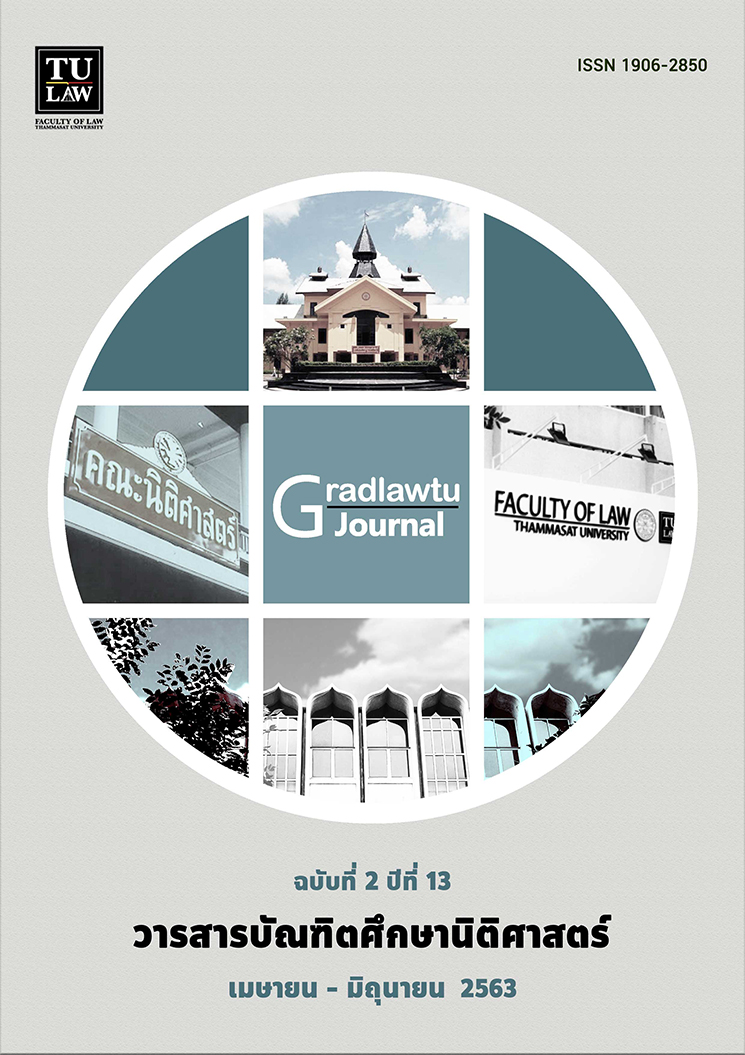ปัญหาในการใช้สิทธิทวงถามหนี้ของเจ้าหนี้ตามกฎหมายว่าด้วยการทวงถามหนี้
คำสำคัญ:
การติดตามทวงถามหนี้, สิทธิของเจ้าหนี้บทคัดย่อ
ปัจจุบัน การก่อหนี้สินมีแนวโน้มเพิ่มสูงขึ้นเรื่อยๆ เมื่อหนี้ถึงกำหนดชำระหนี้หากลูกหนี้ชำระหนี้ตามกำหนดระยะเวลาก็จะไม่เกิดปัญหา แต่ลูกหนี้ส่วนใหญ่มักไม่ชำระหนี้ตามกำหนดระยะเวลา จึงทำให้เจ้าหนี้ต้องดำเนินการทวงถามหนี้ หรือดำเนินการทางศาล ซึ่งเป็นไปตามกฎหมายแพ่งและพาณิชย์ของเจ้าหนี้ตามมาตรา 194 บัญญัติว่า “ด้วยอำนาจแห่งมูลหนี้ เจ้าหนี้มีสิทธิเรียกให้ชำระหนี้” เจ้าหนี้จึงมีสิทธิเรียกให้ลูกหนี้ชำระหนี้โดยใช้สิทธิทวงถามหนี้หรือใช้สิทธิเรียกร้องทางศาล ซึ่งในทางปฏิบัติเจ้าหนี้มักใช้สิทธิเรียกให้ชำระหนี้โดยใช้สิทธิทวงถามหนี้ให้ลูกหนี้ชำระหนี้ ทั้งนี้เพราะเจ้าหนี้ส่วนใหญ่แล้วล้วนแต่ไม่ต้องการใช้มาตรการในการฟ้องร้องดำเนินคดีเพราะจะทำให้เสียเวลา ค่าใช้จ่ายสูงและยังเป็นการทำลายความสัมพันธ์กับลูกหนี้ในภายภาคหน้า การทวงถามหนี้ เจ้าหนี้อาจดำเนินการทวงถามได้ด้วยตนเอง หรือเจ้าหนี้อาจมีการตั้งตัวแทนให้ไปดำเนินการติดตามทวงถาม หรือเจ้าหนี้อาจมอบหมายให้ผู้รับจ้างทวงถามหนี้เป็นผู้ดำเนินการติดตามทวงถามแทนตนก็ได้ ซึ่งเจ้าหนี้อาจดำเนินการติดตามทวงถามหนีโดยใช้วิธีการติดตามทวงหนี้ที่เป็นธรรมหรือไม่เป็นธรรมกับลูกหนี้ก็ได้ จนหลายประเทศได้มีการบังคับใช้กฎหมายที่เรียกว่า “กฎหมายว่าด้วยการทวงถามหนี้อย่างเป็นธรรม” เพื่อปกป้องสิทธิของลูกหนี้ในกระบวนการติดตามทวงถามหนี้ ทั้งนี้ รวมถึง ประเทศไทยด้วยที่มีการบังคับใช้กฎหมาย “พระราชบัญญัติการทวงถามหนี้” อย่างไรก็ตาม กฎหมายนี้ต้องไม่เป็นการบัญญัติหรือกำหนดข้อปฏิบัติและข้อห้ามปฏิบัติอันเป็นการลิดรอนสิทธิโดยชอบด้วยกฎหมายในการติดตามทวงถามหนี้ของเจ้าหนี้จนเกินไปทำให้เจ้าหนี้เสียเปรียบ เดือดร้อน ผู้เขียนจึงได้ศึกษาถึงถึงรายละเอียดของกฎหมายว่าด้วยการติดตามทวงถามหนี้ในสหรัฐอเมริกา ออสเตรเลีย และนอร์เวย์ เปรียบเทียบกับพระราชบัญญัติการทวงถามหนี้ พ.ศ. 2558 ของไทย
เอกสารอ้างอิง
2. ศนันท์กรณ์ โสตถิพันธุ์. คำอธิบายกฎหมายลักษณะหนี้ (ผลแห่งหนี้). พิมพ์ครั้งที่ 3. แก้ไขเพิ่มเติม. กรุงเทพมหานคร :วิญญูชน, 2560
3. สุพิศ ประณีตพลกรัง. กฎหมายว่าด้วยการทวงถามหนี้. พิมพ์ครั้งที่ 1. กรุงเทพมหานคร :อินเตอร์บุ๊คส์, 2558.
4. ปองทิพย์ สามัติยากร. “การติดตามทวงถามหนี้อย่างเป็นธรรม : ศึกษาเปรียบเทียบกฎหมายของสหรัฐอเมริกาและกฎหมายไทย”.วิทยานิพนธ์มหาบัณฑิต คณะนิติศาสตร์ จุฬาลงกรณ์มหาวิทยาลัย, 2550.
5. พงศ์ภัทร นาคเพชร. “การคุ้มครองลูกหนี้จากการทวงถามหนี้ในลักษณะที่ไม่เป็นธรรม : ศึกษาวิเคราะห์ร่างพระราชบัญญัติการทวงถามหนี้ พ.ศ...”. วิทยานิพนธ์มหาบัณฑิต คณะนิติศาสตร์ มหาวิทยาลัยธรรมศาสตร์, 2556.
6. พระราชบัญญัติการทวงถามหนี้ พ.ศ. 2558
7. THE FAIR DEBT COLLECCTION PRACTICES ACT
8. ACT OF 13 MAY 1988 NO.26 ON DEBT COLLECTION) AND OTHER RECOVERY OF OVERDUE PECUNIARY CLAIMS (DEBT COLLECTION ACT)ELETRONIC MEDIAS
9.Debt collection guideline for collection and creditor. https://download.asic.gov.au/media/3549402/rg96-published-29-february-2016.pdf ,February 2016.
10. ACCC and ASIC – Debt Collection role and contact details. https://download.asic.gov.au/media/3549402/rg96-published-29-february-2016.pdf ,February 2016.
11. https://www.lawyersnorway.eu/debt-collection-in-norway.
12. https://www.ftc.gov/enforcement/rules/rulemaking-regulatory-reform-proceedings/fair-debt-collection-practices-act-text.
ดาวน์โหลด
เผยแพร่แล้ว
ฉบับ
ประเภทบทความ
สัญญาอนุญาต
บทความหรือข้อความคิดเห็นใด ๆ ที่ปรากฏในวารสารบัณฑิตศึกษานิติศาสตร์เป็นความรับผิดชอบของผู้เขียนบทความโดยเฉพาะ คณะนิติศาสตร์ มหาวิทยาลัยธรรมศาสตร์ และกองบรรณาธิการไม่จำเป็นต้องเห็นด้วย



